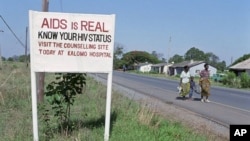The Global Fund to Fight AIDS, Tuberculosis and Malaria is celebrating its 10th Anniversary. The fund says it has saved more than 7 and a half million lives by supporting prevention and treatment programs. However, in November, it announced it had cancelled its next funding round and that no new grants would be approved until 2014. An NGO is warning of the consequences if donors don’t step forward.
The global fund began collecting donations from governments and private foundations in January 2002. Since then, it has approved over $22 billion dollars for hundreds of programs in more than 150 countries.
About 50 countries have contributed. The United States has been the biggest donor, providing 33-percent of the funds pledged each year. In 2010, it pledged more than one billion dollars.
However, when the fund’s board met in Accra, Ghana, in November, officials decided to cancel the next funding round, round 11. Along with the global economic crisis came a sharp drop in donations. Officials now say most of the more than $8 billion in donations expected to arrive by the end of 2013 will be needed to renew existing grants. That leaves no money for round 11.
Don’t stop
The International HIV/AIDS Alliance has released a new report on the global fund called Don’t Stop Now. Alvaro Bermejo is executive director of the NGO.
“We are at a point where science and the tools that we have allow us to think of a world with no AIDS and to plan it within a generation. But at that particular time, donors are faltering on their commitment. The global fund might go without enough funding and this vision will not materialize. So we’re calling on the donors not to stop now when we’re at such a crucial point in the battle against HIV,” he said.
Bermejo praised the fund’s efforts over the last 10 years.
“The global fund has been key to the response to HIV, as well as for TB and malaria. The great progress that’s been achieved in these three diseases just wouldn’t have been possible without it,” he said.
The economic crisis has forced many AIDS-related organizations to rethink funding priorities and to become much more efficient.
Bermejo said, “I think it’s true that we have to be as efficient as one can be and there are certainly opportunities to be more efficient still. And I think everybody is trying their best. But not funding the global fund now is a major inefficiency because you don’t only lose the momentum you have, you actually slide backwards and many of the gains that we’ve made will be wasted.”
Filling the gap
The International HIV/AIDS Alliance estimates the shortfall to be about $2 billion.
“The gap that we have now is mainly produced because donors that pledged to give money to the global fund when it had its replenishment conference in New York in 2010 – those pledges that were made have not been fully met. So donors haven’t lived up to the promises they made,” said Bermejo.
The alliance report examines the potential effects of the funding shortfall in 5 countries.
“In Zambia, for example, an estimated 130,000 people that need lifesaving access to antiretroviral therapy today will not be able to access it. In South Sudan, the newest country in the world, which has a very good HIV/AIDS prevention strategy that has been costed, 80 percent remains unfunded,” he said.
Similar conditions are reported in Zimbabwe, Bolivia and Bangladesh.
The alliance makes three recommendations. First, it calls on donors to honor existing pledges to the global fund. Next, it says national governments must increase their own investment in HIV programs. And finally, it recommends bilateral donors fill critical service gaps not covered by existing programs. Bilateral donors are U.N. member states that provide aid directly to other countries.
The head of the International HIV/AIDS Alliance said he’s still hopeful a new round of funding will be held this year, possibly even before the 19th International AIDS Conference is held in Washington, DC in July. The conference is the world’s largest AIDS related gathering.




















